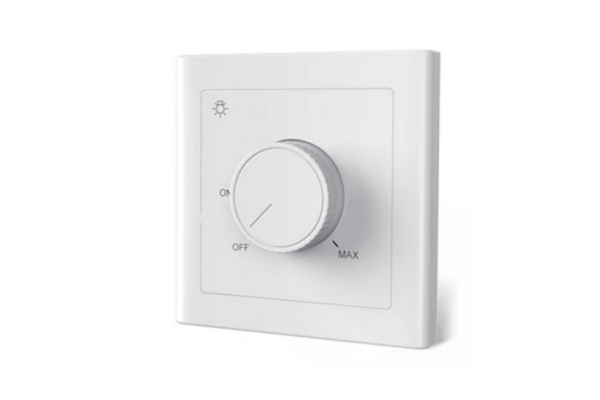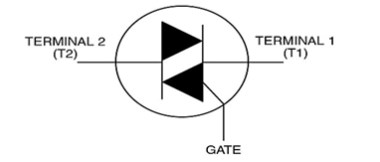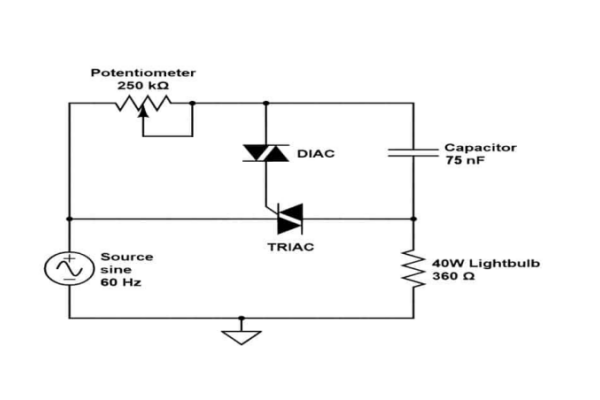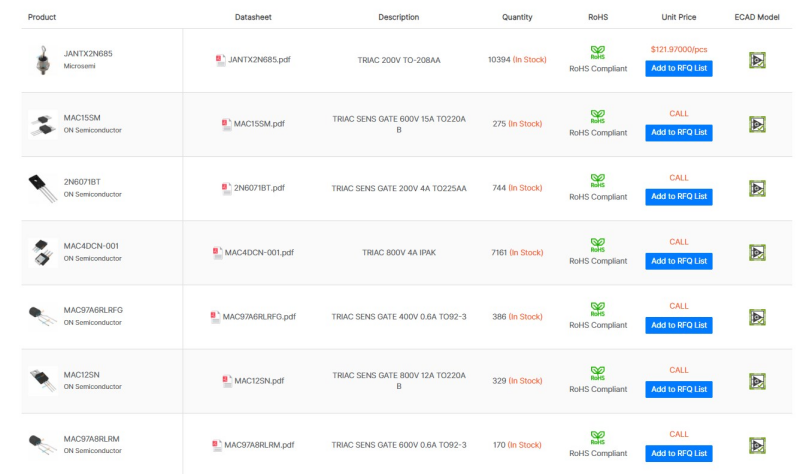OUTLINE:
What Is A Triac Dimmer Switch: Comprehensive Guide
 497
497Why do we need a dimmer switch? A dimmer allows you to adjust the output level of the load light, so you can get the perfect lighting atmosphere and lighting level in any space.
At present, non-energy-saving lighting dimming mainly uses TRIAC dimmers (three-terminal bidirectional thyristor) for dimming, and TRIAC dimmers are also the most widely used dimmers.
Let's explore the workings of TRIAC dimmer switches, their advantages, available types, and the wide range of applications they serve.

What is a TRIAC Dimmer Switch
A TRIAC is a tiny semiconductor device that functions similarly to a diode or transistor. A triac, like a transistor, consists of many layers of semiconductor material. This comprises N-type material, which has numerous free electrons, as well as P-type material, which has many "holes" through which free electrons can pass.

A TRIAC dimmer switch is a type of dimmer switch that uses TRIAC (Triode for Alternating Current) technology to control the brightness of a light bulb.
TRIAC dimmers offer a convenient way to control lighting systems with an easily adjustable dial. It is a common type of dimmer switch used in residential and commercial settings.
Why We Need TRIAC
DC (Direct Current) is a single consistent rate of direct current. Therefore, DC dimming is as simple as connecting a light bulb to a variable power source that can limit the current. In contrast, AC (alternating current) flows in a sinusoidal wave form, from positive to negative. Using a DC dimmer on an AC device will reduce positive current, but cannot handle negative current.
Therefore, specialized circuits such as TRIAC are required for dimming AC devices. TRIAC dimmers use thyristors to allow AC current to flow in both the negative and positive directions. To maximize AC dimming efficiency, a TRIAC dimmer must be used.
How Does A TRIAC Dimmer Switch Work
Unlike traditional on/off switches, which simply open or close the circuit, TRIAC dimmers can vary the intensity of the light by adjusting the amount of AC current that passes through the lamp.
TRIAC dimmer switches regulate the brightness of light bulbs by generating pulses of AC current through the use of thyristors, capacitors, and potentiometers.
The thyristor acts as a gatekeeper, allowing current flow only when the gate is triggered. Capacitors store and release electrical energy to control the gate triggering, while potentiometers adjust the timing of the gate trigger. By controlling the duration of the pulses, TRIAC dimmers can effectively control the brightness of the lights.

Key Features of Triac Dimmer Switches
Smooth Dimming: Provides smooth and continuous adjustment of light levels.
Compatibility: Suitable for use with resistive loads (incandescent, halogen) and some dimmable LEDs.
Silent Operation: Typically operates silently without the hum associated with some older dimmer technologies.
Energy Savings: Can reduce energy consumption by lowering light output when full brightness is not needed.
Benefits of Using A TRIAC Dimmer Switch
- Cost efficient compared to other dimming technologies
- Can support high voltage electrical devices
- Easy installation process, typically only replacing the wall switch
- Reliability, as it is a purely analog technology and not susceptible to hacking or compatibility issues
Types of TRIAC Dimmer Switches
TRIAC dimmer switches come in various types to suit different needs, from basic single pole switches to advanced multi-location and smart switches.
Single Pole Switches:
- Can control one light at a time
- Uses a three-wire design with hot, neutral, and ground wires
- Has an on/off button and a slider or dial for brightness control
3-Way/4-Way Switches:
- Controls one or more bulbs from two different locations
- Uses a four-wire design with traveler wires instead of neutral wire
- Allows for control from multiple switches in different locations
Multi-Location Switches:
- Advanced version of 4-way dimmer switch
- Can control lighting system from more than three locations
- Provides higher precision and control for larger open-concept areas
Plug-in Switches:
- External dimming drivers wired into wall socket
- Used for desk or floor lamps to enable dimming controls
- Compatible with dimmable LED bulbs (not all LED bulbs are dimmable)
Smart Switches:
- Transmitter built into the switch connects to smartphone
- Allows control of lighting from anywhere with wireless connection
- Offers scheduling and automation features for convenient lighting control

Applications for TRIAC Dimmer Switches
TRIAC circuits are widely used, and very common in AC power control applications. TRIAC dimmer switch offers a convenient lighting control experience for various home appliances.
Residential lighting control for incandescent, halogen, and dimmable LED bulbs. (Not all LED lights work with Triac dimmers. Make sure the LED bulbs are branded as dimmable and compatible with leading-edge or trailing-edge dimmers.
Commercial and office spaces to create desired lighting atmospheres.
Hospitality industry for enhanced guest experiences.
Theatrical and entertainment lighting for dynamic effects.
Outdoor lighting installations for safety and aesthetics.
Exhibition and art display lighting to highlight artwork.
Industrial facilities for customizable lighting conditions.
Consumer Grade Dimming Solutions – TRIAC vs. PWM vs. 0-10v
When it comes to consumer-grade dimming solutions for LED lighting, there are several options available, including TRIAC, PWM, and 0-10V dimming.
TRIAC dimming: an analog method that cuts off current to the electrical device. It breaks the AC signal into chunks, allowing only small bits of current to flow to the light bulb. TRIAC dimming is limited to AC power supply compatibility and doesn't require computer software for control.
PWM dimming: a digital method that rapidly turns the power supply on and off. This results in less current flow to the device, creating the illusion of dim light. PWM dimming is commonly used in computer hardware, such as PC fans and RGB LED lighting.
0-10V dimming: an analog method where a dimmer switch sends out electrical signals between zero and ten volts. The receiving LED driver adjusts the brightness based on the provided voltage, with 0V representing minimum brightness and 10V representing maximum. This dimming method is compatible with LED lights that work with DC power supplies.
Each of these dimming solutions has its advantages and considerations, and the choice depends on the specific requirements and compatibility of the LED lighting system.
|
|
TRIAC |
PWM |
0-10v |
|
Dimming Technology |
Analog |
Digital |
Analog |
|
Input |
AC |
DC |
DC |
|
Light Voltage Support |
High |
Low |
Low |
Tips: You Can Buy Switches on Chipsmall
If you need to purchase these useful triac dimmer switches, consider Chipsmall to ensure you select high-quality and suitable products for your project. You can filter the different manufacturers and see more details on the pages. Add it to the RFQ list, and our sales team will reply to you within 24 hours.

Chipsmall Limited consists of a professional team with an average of over 20 years of expertise in the distribution of electronic components. Main products comprise ICs, resistors, capacitors, modules, potentiometers, IC sockets, relays, connectors and so on.
Final Verdict
TRIAC dimmer switch provide a good way to control the brightness of light bulbs. TRIAC circuits not only improve the convenience of our lives, but also play an important role in energy conservation and emission reduction. They help you regulate light intensity, and the range of available types and easy installation, make them a popular choice in the lighting industry. I hope this passage can help you pick a suitable one for your home.

Disclaimer: The views and opinions expressed by individual authors or forum participants on this website do not represent the views and opinions of Chipsmall, nor do they represent Chipsmall's official policy.

share this blog to:

